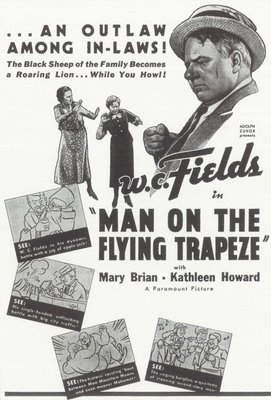
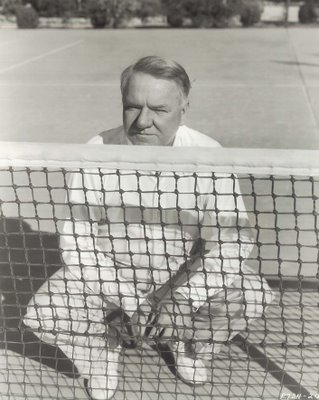
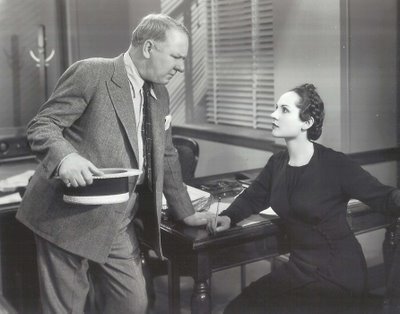
The Great Man --- Part Two
Sixties Fields cultists preferred the charlatan. Domestic purgatory was a less inviting prospect for college audiences who were themselves on the cusp of lifetime commitment and adult responsibilities. Might we end up like Bill, with a hectoring shrew wife and rotten kids leaving roller skates in our path? It’s A Gift was disturbing forecast of the darker possibilities of life after school. Better to enjoy Larson E. Whipsnade lording it over suckers and outwitting the sheriff. Fields was dominant in those situations. That’s still how we remember him best. Family Man Fields was submissive --- Carnival Fields prevailed. My own early exposure tended to favor Poppy, You Can’t Cheat An Honest Man, Mississippi --- anything with the promise of carefree maturity where chumps finished last and all your opponents came away with empty pockets. The flip side was more disturbing because this was where Fields sought to impart some truth about our futures, and You’re Telling Me, The Man On The Flying Trapeze, and especially It’s A Gift (great comedies all) reveal that life, particularly family life, isn’t pretty. He actually preferred making these. They allowed him to record incidents as he recalled them, people as he understood them. You assume that everything happening to Bill in these features had occurred in his real life. It seemed too honest and accurate to have been made up. There were writers, but everything in the end was his. Paramount had no choice but to let Fields run the show. No one else shared his demons, certainly no one could loose them in such a way as to produce the laughter he did.
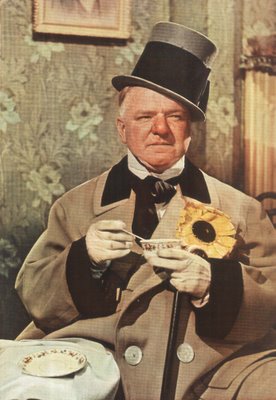
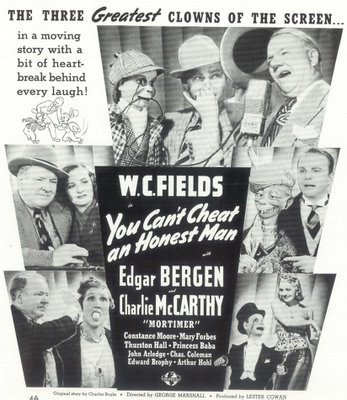
Fields needed directors who knew comedy, preferably men who had been on the road in stock and vaudeville. Such was the great fraternal order of performing artists. Youthful talent like Leo McCarey (Six Of A Kind) was at first regarded with suspicion, as were those who had come from differing backgrounds, such as trained in art direction Mitchell Leisen. On The Big Broadcast Of 1938, Fields antagonism toward director Leisen was such that he simply turned over to Fields the management of comic highlights, happy result the gas station and golf game sketches that open the film. As long as his comedies were made for a price, Fields enjoyed a remarkable degree of creative freedom. I think another secret of his on-set control may have been an apparent willingness to just walk away. He had avoided much of personal overhead that otherwise chained contract talent to studios. Fields liked to plead poverty (according to him, nobody laughs at a rich man), but was always comfortable enough to give the bird to overbearing employers. Photos of Fields at home reflect contentment with a good life that included cooking staff and private tennis courts (Fields was quite an athlete in his prime). Health problems were his downfall, exacerbated by alcohol. It seemed as though each new Fields picture would be his last, and there were lengthy periods of absence from the screen. Radio was a happy solution at first, but the pressure of coming up with funny material on a weekly basis created stress beyond anything he had experienced at Paramount, broadcasting becoming almost as sporadic as his movie appearances.
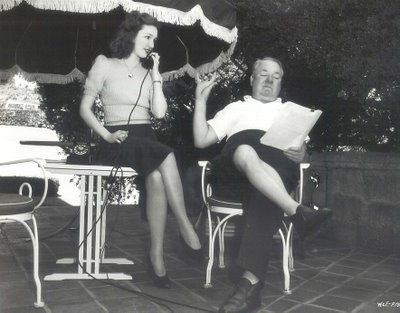
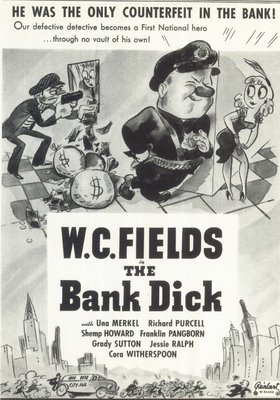
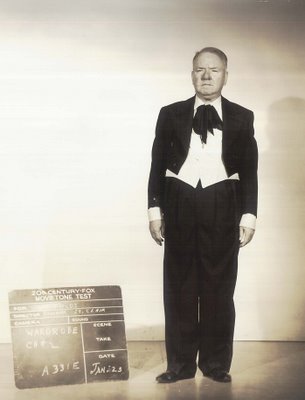
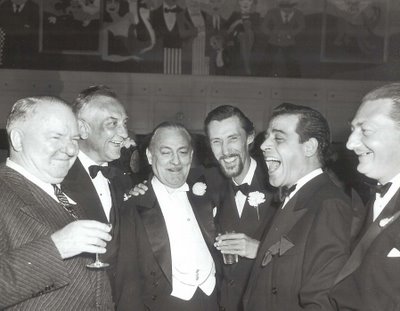
Fields was long since estranged from wife and child, but they would resurface from time to time throughout his life, and in fact, he did have a rapprochement with son Claude toward the end. Otherwise, there was a series of mistresses in and out of Field’s life, most notable the strikingly beautiful Carlotta Monti, who lived long enough to profit from the 60's revival with a memoir about their years together. She played Fields' secretary, her real life role as well, in The Man On The Flying Trapeze (1935). I’d heard for years how Fields wrote stories on backs of envelopes and bamboozled fortunes out of Universal for their screen adaptation. Alas, that appears to be myth, for in fact, Fields poured enormous effort into preparation of four comedies he did for Universal. These would become the comedian's primary legacy thanks to successful theatrical reissues during the late sixties and seventies. Fields was fairly trapped by the flamboyant image he and press agents fostered over the years, so he was less a human being than some Dickens character brought to life (he played Micawber most convincingly in 1935's David Copperfield). Efforts to cast him as The Wizard Of Oz came very close to reality, but delay and prior commitment to do You Can’t Cheat An Honest Man put paid to that tantalizing possibility. Would his presence in Oz have been too overpowering? He surely would have embellished the role, and we would naturally want more of him. Fields might well have played off other characters more effectively than Frank Morgan --- but would The Wizard Of Oz have suffered for all of us just wanting our man to exclusion of other cast members? Fields would work past a body's endurance --- he knew no other way to live, so retirement, at least voluntary, was no option. Four starring features for Universal skidded down in terms of boxoffice revenue, and by a certain point, studios couldn't get Fields insured even if they wanted to star him again. Upshot was "guest" spots where risk was smaller, his name still valuable if less so than before. Everyone knew Fields was a sick man, so welcomed him wherever energy could be summoned to perform, be it radio, screen cameos, even writing he turned a humorous hand to.
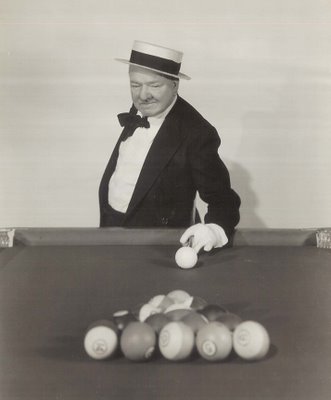
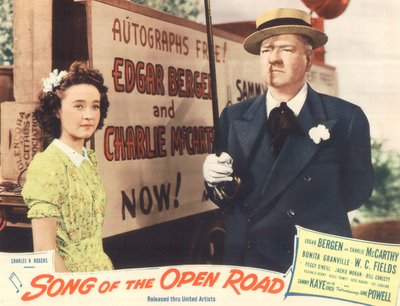
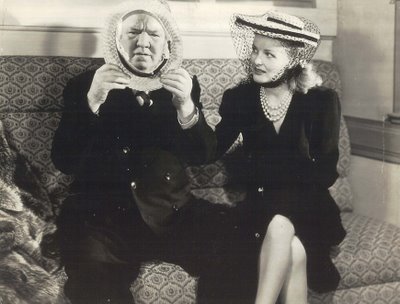
This merry group you see with Bill includes a well-lubricated John Barrymore, John Carradine, and John Decker, among others. It was this sort of company that laid Fields low during final years when he couldn’t get insured to do another feature. Audience apathy was another factor. James Curtis writes that The Bank Dick and Never Give A Sucker An Even Break were both D.O.A. at the B.O., so Universal wanted no further part of him. From here on in, screen work would be limited to specialty appearances and "guest" cameos (here playing pool in one of them, Follow The Boys). The costume test is from Tales Of Manhattan, but Field's contribution to that omnibus feature was cut prior to release, despite preview audiences who said it was the best thing about an otherwise unremarkable show. Now it’s back at last, in a DVD compilation of Fox outtakes, and Field’s footage is alone worth the price. One of his secretaries from those idle years (could it be the one seated outdoors with him here?) recalled Bill only once using his stage voice, and that when they encountered some fans while out on a drive. I wonder what W.C. Fields did sound like when he wasn’t being W.C. Fields… Anyway, toward the end he speculated as to how things might have turned out had he left the whisky alone. A longer life perhaps, but he surely wouldn’t have been the Fields we know and revere.
13 Comments:
Thanks as always for such insightful postings, John. It might be mentioned that Universal didn't recruit him because he was W. C. Fields, the movie comedian; the studio just needed the radio stooge for Edgar Bergen and Charlie McCarthy, who were getting the star treatment (and were initially billed above Fields) for "You Can't Cheat an Honest Man."
It's too bad Fields didn't continue at Universal; his co-star Gloria Jean recalls that he was already planning his next picture when the studio dropped him in 1941. "Never Give a Sucker an Even Break" wasn't a total disaster at the box office but it was certainly a matter of taste; some exhibitors liked it, and others hated it. Since then its reputation as a comedy classic has been assured. If anyone at Universal is reading this, have you considered releasing "Sucker" on DVD?
In the photo of Fields with John Barrymore I believe the man to W.C.'s left is the writer Gene Fowler, who wrote some terrific stuff about his friendship with both men.
Great site by the way
Pretty insightful writing. Even when I disagree totally (your view of the old OUTER LIMITS TV show and mine are poles apart) you still have good stuff to say. I especially like your remark about how violent was the world in which Fields grew up. We forget how, in spite of many horrific crimes that DO go on, we really do live in a less violent age. For the most part. Nothing like a detailed knowledge of history to kill time travel fantasies. That and regular viewing of the TV show THE WORST JOBS IN HISTORY.
I can't tell you how sad it makes me that the folks under 40 never experienced the joy of Fields, the Brothers Marx, or the sheer joyousness of Paramount early 1930s comedies. SIGH!
Speaking of that photo with Fields, Barrymore, Carradine, et al. -- Does anyone know where that picture was taken? The mural on the wall behind them looks awfully familiar to me, but I can't place it (probably something I've seen in a movie or on TV, rather than someplace I've been in person).
Scott's right about Fields being more or less a stooge for Bergen. The biggest exposure he had from the late thirties to the end was in those radio shows --- what a shame he couldn't have continued his series at Universal, but health problems were really weighing heavily upon him by this time, plus the fact that his shows ran a very distant second to the Abbott and Costello features being done during the same period at Universal ...
Love these articles. I think all of the great old comedians are going to be forgotten but for a cult of film buffs now that DVD and cable have become so dominant. I discovered Fields and the rest (although WC is the BEST EVER) thanks to the small number of choices available on 70's TV. Now you have to seek him out on TCM once in a blue moon and who will do that except for buffs? Same with DVD. Even if his best films (Trapeze and Old Fashioned Way) are released, who will buy them except the already converted? Not to mention a whole generation that looks at Black and White film with raised eyebrows. Oh well, I'll always treasure WC and Stan and Ollie and Buster and Charlie and the rst.
"We forget how, in spite of many horrific crimes that DO go on, we really do live in a less violent age."
I read somewhere a while back what the murder rate was in Elizabethan England. Basically those guys didn't walk around with swords for nothing. The point was that one of the major, if largely unheralded, accomplishments of western civilization has been getting the violent death rate down by about 95% in the last 500 years....
Anyway, back to Fields-- I know everyone recommends the Curtis bio but I also enjoyed the Louvish one-- he does a nice job of showing how some of Fields' routines in his movies dated back to stage versions 30+ years earlier. Something like the porch scene in It's a Gift had literally been tested and refined in front of hundreds of audiences over decades before it finally achieved screen immortality. And people wonder why comedies aren't as good today!
Although one would love to see how W.C. Fields would have played The Wizard of Oz, it'd sure be a shame to deprive Frank Morgan of his moment of immortality (and without that film, what would he have? The Shop Around the Corner, I guess.) Fields might well have overpowered the film in that role, for all that he fitted in beautifully in David Copperfield. Morgan's gentler whimsy is maybe better suited to the role in the end.
Say what you will about Fields's domestic comedies, there is no funnier picture anywhere than "It's a Gift." Not one bum moment in the entire picture and the porch scene is one of the greatest sequences ever committed to film (along with the Weenie King in "The Palm Beach Story").
Fields's Universal pictures are not without their charm (Daisy Dumont), but the Paramounts and Sennetts are his legacy.
There's a 1986 PBS documentary on Fields now available on DVD:
http://www.duckprods.com/
projects/wcfields.html
Ugh. The Louvish book... if I could think of a Hollywood bio to avoid more than this one, it would only be the Louvish Laurel & Hardy book or the Louvish Marx Bros. book.
When I watch the Wizard of Oz, I hear Fields' voice anyway... Sitting in front of a wagon plastered with a poster bragging how Prof. Marvel has performed in front of all the crowned heads of Europe, Dorothy asks the Prof. if she can go with him and see the crowned heads. "Do you know any?" he retorts. Also, "Pay no attention to the man behind the curtain!" Prime Fields lines.
There is hope, folks. I've been requested to show "The Producers" (the real one, not the remake) to a group of average age thirty. As it's shortish, I asked if they'd like a second feature.
They would - they want WC Fields!
"Ugh. The Louvish book"
What don't you like about it/him? I read it when it came out, so all I remember about it is the stuff about the long history of some of those routines, which seems solid enough.
Just yesterday TCM UK showed COPPERFIELD for the first time in years. ...and that's the extent of the Great Man on UK TV...and pretty much any similar stuff. A few years ago there was a showing of the early Marxes and THE MAN WHO CAME TO DINNER turned up a few weeks ago...but it is all few and far between....unlike the late60s/early 70s when SUCKER/EVEN BREAK /BANK DICK & CHICKADEE all appeared regularly on Detroit /Toledo TV.....
Post a Comment
<< Home